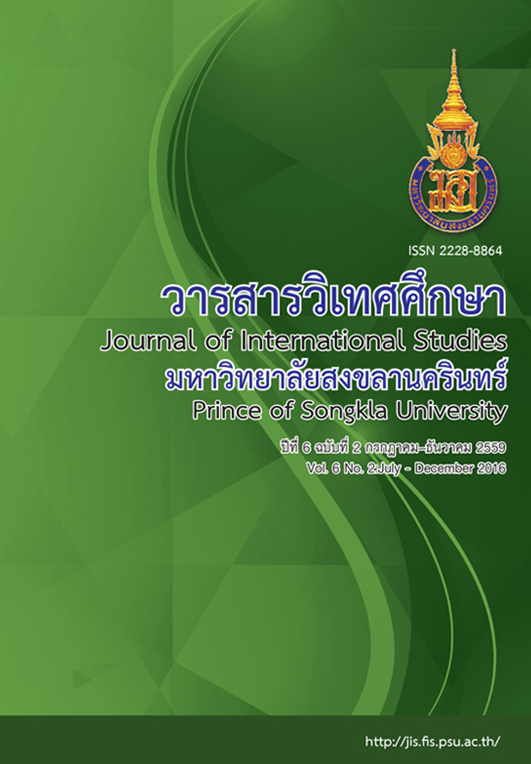The Buddhism in Vietnam: History, Cultural and Social Relationship
Main Article Content
Abstract
The objectives of this research are to study the history and development of Buddhism and its social and cultural roles and to analyze the trend of Buddhism in the Socialist Republic of Vietnam. Documentary and field researches were implemented in northern, central and southern regions of the country. The study found that in the early period, Vietnam was under the rule of China for a thousand years. Then the country was influenced by Buddhism, Taoism and the belief of worshipping ancestors. Vietnam then fell under the French colony that severely deteriorated Buddhism. Buddhists’ role in national administration was diminished. Liberation movement against France took place. Monks had a leading role in protesting for Buddhism protection and they even committed self-burning suicide. Vietnamese Buddhist association was also established. In post-colonization period, as Vietnam was divided by the Geneva Resolution, Sangha council was separated into socialist system in the north and democratic system in the south. Ho Chi Minh later liberated North Vietnam and conjugated South Vietnam into a unitary state. Religious organizations, thus, comply themselves with the aim and principle of socialist communist system.
Findings on social and cultural roles of Buddhism in Vietnam: Buddhism in Vietnam is mainly in Mahayana sect in the north that most believers are Kinh ethnics. They believe in Bodhisattva and Buddha’s Pure Land that immensely influence the people’s belief. Theravada sect takes major role in the south. Most followers are Khmer Krom ethnics. They have their own Buddhism identity within Khmer culture. Temples and shrines reflect the cultural diversity influenced by Chinese, Indian and western culture. Furthermore, there are important traditions and rites related to Buddha and Bodhisattva especially the birth and enlightenment memorial days. There is also another special ceremony called Ted, the traditional New Year’s event, for paying homage to the significant persons, ancestors and angels. iIn addition, monks have their roles in promoting education, social welfare, community development, arts and culture that Sangha councils in central, provincial and district levels take their roles in various administration and support.
For the trend and direction of Buddhism in Vietnam, it has been found that the relationship between the government and religious sector in Vietnam has been proceeded through religious, cultural and traditional activities in order to diminish conflicts in the past and to enhance stability of both parties. The situation of Buddhism has been relieved and destined for the better after monk Thich Nhat Hanh was able to visit his hometown with a warm welcome in Vietnam that attracted international community. Furthermore, Vietnam hosted an International Buddhist Conference with the highest number of Buddhist participants in May 2008. However, Buddhism in Vietnam is still under the supervision of the government and has its role in the mid of diversity under the fundamental belief and other religions that can be characterized as “Vietnamese Buddhism Model”.
Article Details
Statements and opinions expressed in articles herein are those of the authors and do not necessarily reflect the position of the editors or publisher.
Article, information, text, image, etc. which are published in Journal of International Studies, belong to Journal of International Studies. If anybody or any organization would like to use part or whole of them, they must receive written permission from Journal of International Studies before usage.
References
เขียน ธีระวิทย์. (2542). เวียดนาม: สังคม เศรษฐกิจ ความมั่นคง การเมือง และการต่างประเทศ. กรุงเทพมหานคร: สถาบันเอเชียศึกษา จุฬาลงกรณ์มหาวิทยาลัย.
จำนงค์ ทองประเสริฐ. (2554). ประวัติพุทธศาสนาในเอเชียอาคเนย์. (พิมพ์ครั้งที่ 3). กรุงเทพมหานคร: สำนักพิมพ์ดวงแก้ว.
ชัยวุฒิ พิยะกูล. (2552). พัฒนาการและบทบาทของพุทธศาสนาบริเวณลุ่มทะเลสาบสงขลา. กรุงเทพฯ: สำนักงานกองทุนสนับสนุนการวิจัย (สกว.).
พระพรหมคุณาภรณ์ (ประยุทธ์ ปยุตฺโต). (2555). พระพุทธศาสนาในอาเซีย. (พิมพ์ครั้งที่ 6). กรุงเทพมหานคร: โรงพิมพ์พระพุทธศาสนาของธรรมสภา.
มนธิรา ราโท. (2556). ภาพสะท้อนทางสังคมและวัฒนธรรมจากนิทานพื้นบ้านภาคใต้ของเวียดนาม. วารสารศิลปศาสตร์ มหาวิทยาลัยอุบลราชธานี (ฉบับพิเศษ) พิพิธทัศนาภาษาและวัฒนธรรมเวียดนาม. หน้า 49-85.
ยุกติ มุกดาวิจิตร. (2556). เวียดนามที่ไม่ใช่มังกรน้อย: อ่านประวัติศาสตร์เวียดนามผ่านพื้นผิวของอดีต. วารสารศิลปศาสตร์ มหาวิทยาลัยอุบลราชธานี (ฉบับพิเศษ) พิพิธทัศนาภาษาและวัฒนธรรมเวียดนาม. หน้า 89-131.
วัชรี ศรีคำ. (2544). พุทธศาสนาในเวียดนามหลังการรวมประเทศในปี ค.ศ.1975. รวมบทความประชุมวิชาการเรื่องอินโดจีนในกระแสการเปลี่ยนแปลง. จัดโดยศูนย์วิจัยสังคมอนุภูมิภาคลุ่มน้ำโขง คณะศิลปศาสตร์ มหาวิทยาลัยอุบลราชธานี, 29-30 พฤศจิกายน 2544: 256-270.
วิทย์ บัณฑิตกุล. (2555). สาธารณรัฐสังคมนิยมเวียดนาม . (พิมพ์ครั้งที่ 2). กรุงเทพมหานคร : สำนักพิมพ์สถาพรบุ๊คส์.
สรณี วงศ์เบี้ยสัจจ์ (บรรณาธิการ). (2550). เวียดนาม: หน้าต่างสู่โลกกว้าง. (พิมพ์ครั้งที่ 2). กรุงเทพมหานคร: สำนักพิมพ์หน้าต่างสู่โลกกว้าง.
สุด จอนเจิดสิน. (2543). เวียดนามกับการปฏิรูปประเทศตามนโยบายโด๋ย เม้ย (พ.ศ. 2529 -2539). กรุงเทพมหานคร: โครงการตำราคณะอักษรศาสตร์ จุฬาลงกรณ์มหาวิทยาลัย.
เหงียนคักเวียน (Nguyen Khac Vien) (เขียน) เพ็ชรี สุมิตร (แปล). (2545). เวียดนาม: ประวัติศาสตร์ฉบับพิสดาร. กรุงเทพฯ: โรงพิมพ์มหาวิทยาลัยธรรมศาสตร์.
อนุชา ม่วงใหญ่. (ม.ป.ป.). บทบาทความสัมพันธ์ของเวียดนามต่อประชาคมโลกในศตวรรษที่ 21. เอกสารเผยแพร่ของศูนย์ศึกษายุทธศาสตร์ สถาบันวิชาการป้องกันประเทศ กองบัญชาการกองทัพไทย. ม.ป.ท.
Ho Phuong Lan. (2012). Van Hoa Phat Giao Va Lich Su Cac Ngoi Chua O Viet Nam (เรียนรู้หลักการวัฒนธรรมและประวัติศาสตร์พระพุทธศาสนาของเวียดนาม), Ho Chi Minh: Tai Cong Ty.
Mae Chee Huynh Kim Lan. (2010). A Study of Theravada Buddhism in Vietnam. Bangkok: Mahachulalongkornrajavidyalaya University.
Nguyen Khac Canh, et al. (2012). The Khmer in the South of Vietnam. Hanoi: VNA Publishing House.
Nguyen Lang. (2012). Viet Nam Phat Giao Su Luan (การเปรียบเทียบพุทธศาสนาในเวียดนาม). Ho Chi Minh: Nha Suat Ban Phuong Dong.
Nguyen Thanh Xuan. (2012). Religion in Vietnam. Hanoi: The Gioi Publishers.
Nguyen T.T. (1996). Phat giao o Viet Nam nhung van de dat ra hien nay. Ton giao tin nguong hien nay: May van de ly luan va thuc tien cap thiet. Hanoi: Trung tam thong tin-tu lieu.
Phung Thi My (editor). (2012). The Khmer in the South of Vietnam. Hanoi: Nha Xuat Ban Thong Tan.
Sidler, Peter. (1994). Power, religion and economy in Vietnam. Swiss review of world affairs, (5), 14-17.
Thich T.A. (1965). Phat giao Vietnamxua&nay. Saigon: Sen Vang.
Vietnam Buddhist Sangha, National Department of International Buddhist Affairs. (2011). A Brief History of Buddhism in Vietnam. Hanoi: Phuong Dong Publishing House.
รายชื่อผู้ให้สัมภาษณ์
Associate Professor Dr. PHAM Hong Tung ผู้อำนวยการ Science & Technology Department, Vietnam National University, Hanoi วันที่ 23 มีนาคม 2556.
พระมหาการุณ การุนิโก ผู้ช่วยเจ้าอาวาสวัดพุทธเถรวาทเวียดนาม (วัดอภิสุญญตาราม) เมือง Hue วันที่ 17 เมษายน 2557
Ms. Nguyen Thi Kim Thoa (ปิ่นแก้ว), (ไกด์จากเมือง Vinh), 17 เมษายน 2556.
Ms.Ton Nu Thi Na (นักศึกษาจากเมือง Hue), 17 เมษายน 2556.
นายสุบิน (ประชาชนที่เมือง Ho Chi Minh City ในเวทีการประชุมระดับชาติครั้งที่ 7 ขององค์กรพุทธศาสนาแห่งเวียดนาม), 11 พฤษภาคม 2556
พระให้ (หตฺถจิตฺโต) พระนิสิต มจร.วิทยาเขตอุบลราชธานี จากจังหวัด TraVinh, 23 มิถุนายน 2556.
พระมหาการุณ การุนิโก, (ผู้ช่วยเจ้าอาวาสวัดเถรวาท Huen Khong son Tuong pagoda เมือง Hue), 17 เมษายน 2556.
พระทัจ วาย (Thach Why), เจ้าอาวาสวัดโพธิสาลาราช (Bodhisalaraja) หรือวัดกำปง (Kompong) จังหวัดตราวิงห์ (Travinh) ประเทศเวียดนาม, วันที่ 12 พฤษภาคม 2556.
พระนักศึกษาชั้นปีที่หนึ่ง วัด Vinh Nghiem (มหายาน) (Ho Chi Minh City), 11 พฤษภาคม 2556.
พระมโน, เลขาหลวงพ่อเจ้าอาวาสวัดป่าสมาธิ (เมือง Hue), 17 เมษายน 2556.
พระลูกวัด Angkor Borei (จังหวัด TraVinh), 12 พฤษภาคม 2556.


